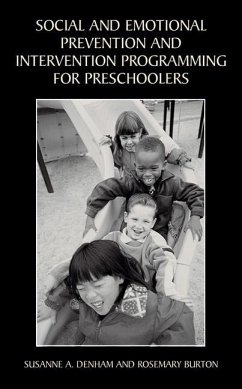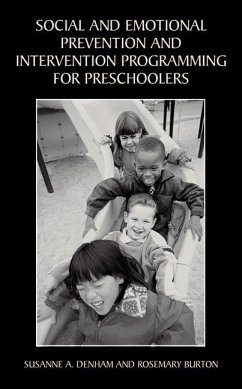Susanne A. Denham, Rosemary Burton
Social and Emotional Prevention and Intervention Programming for Preschoolers
Susanne A. Denham, Rosemary Burton
Social and Emotional Prevention and Intervention Programming for Preschoolers
- Gebundenes Buch
- Merkliste
- Auf die Merkliste
- Bewerten Bewerten
- Teilen
- Produkt teilen
- Produkterinnerung
- Produkterinnerung
Social and Emotional Prevention and Intervention Programming for Preschoolers rests on the idea that young children, under optimal circumstances, develop substantial abilities in social and emotional domains by the time they enter school. These abilities contribute to their success and well-being during these early years, but even more importantly, to both their successful adaptation to school (personal and academic) and their long-term mental health.
The chapters of this volume present theoretical foundations for and explanations of what important adults in young children's lives -…mehr
Andere Kunden interessierten sich auch für
![Social and Emotional Prevention and Intervention Programming for Preschoolers Social and Emotional Prevention and Intervention Programming for Preschoolers]() Susanne A. DenhamSocial and Emotional Prevention and Intervention Programming for Preschoolers81,99 €
Susanne A. DenhamSocial and Emotional Prevention and Intervention Programming for Preschoolers81,99 €![Programming Effective Human Services Programming Effective Human Services]() Programming Effective Human Services83,99 €
Programming Effective Human Services83,99 €![Dynamic Assessment of Young Children Dynamic Assessment of Young Children]() David TzurielDynamic Assessment of Young Children204,99 €
David TzurielDynamic Assessment of Young Children204,99 €![Asperger Syndrome Asperger Syndrome]() Asperger Syndrome121,99 €
Asperger Syndrome121,99 €![Practitioner's Guide to Emotion Regulation in School-Aged Children Practitioner's Guide to Emotion Regulation in School-Aged Children]() Gayle L. MacklemPractitioner's Guide to Emotion Regulation in School-Aged Children41,99 €
Gayle L. MacklemPractitioner's Guide to Emotion Regulation in School-Aged Children41,99 €![A Blueprint for the Promotion of Pro-Social Behavior in Early Childhood A Blueprint for the Promotion of Pro-Social Behavior in Early Childhood]() A Blueprint for the Promotion of Pro-Social Behavior in Early Childhood121,99 €
A Blueprint for the Promotion of Pro-Social Behavior in Early Childhood121,99 €![Handbook of Positive Behavior Support Handbook of Positive Behavior Support]() Handbook of Positive Behavior Support163,99 €
Handbook of Positive Behavior Support163,99 €-
-
-
Social and Emotional Prevention and Intervention Programming for Preschoolers rests on the idea that young children, under optimal circumstances, develop substantial abilities in social and emotional domains by the time they enter school. These abilities contribute to their success and well-being during these early years, but even more importantly, to both their successful adaptation to school (personal and academic) and their long-term mental health.
The chapters of this volume present theoretical foundations for and explanations of what important adults in young children's lives - preschool teachers, daycare providers, parents - can do to encourage the development of such social-emotional abilities, including promoting secure attachment relationships, providing positive behavior guidance, and assisting children in developing emotion knowledge, emotion regulation, social problem-solving skills, and other positive social behaviors.
In addition, the book reviews the current state of early childhood programming in each of these crucial areas, with the addition of a chapter on emergent parent programming on emotion coaching. Recommendations are made for making such programming work, for assessing individual children's development and program efficacy, and necessary future directions for this area are detailed.
Hinweis: Dieser Artikel kann nur an eine deutsche Lieferadresse ausgeliefert werden.
The chapters of this volume present theoretical foundations for and explanations of what important adults in young children's lives - preschool teachers, daycare providers, parents - can do to encourage the development of such social-emotional abilities, including promoting secure attachment relationships, providing positive behavior guidance, and assisting children in developing emotion knowledge, emotion regulation, social problem-solving skills, and other positive social behaviors.
In addition, the book reviews the current state of early childhood programming in each of these crucial areas, with the addition of a chapter on emergent parent programming on emotion coaching. Recommendations are made for making such programming work, for assessing individual children's development and program efficacy, and necessary future directions for this area are detailed.
Hinweis: Dieser Artikel kann nur an eine deutsche Lieferadresse ausgeliefert werden.
Produktdetails
- Produktdetails
- Verlag: Springer / Springer US / Springer, Berlin
- Artikelnr. des Verlages: 978-0-306-47809-3
- 2003
- Seitenzahl: 276
- Erscheinungstermin: 31. Dezember 2003
- Englisch
- Abmessung: 260mm x 183mm x 21mm
- Gewicht: 744g
- ISBN-13: 9780306478093
- ISBN-10: 0306478099
- Artikelnr.: 21601929
- Herstellerkennzeichnung Die Herstellerinformationen sind derzeit nicht verfügbar.
- Verlag: Springer / Springer US / Springer, Berlin
- Artikelnr. des Verlages: 978-0-306-47809-3
- 2003
- Seitenzahl: 276
- Erscheinungstermin: 31. Dezember 2003
- Englisch
- Abmessung: 260mm x 183mm x 21mm
- Gewicht: 744g
- ISBN-13: 9780306478093
- ISBN-10: 0306478099
- Artikelnr.: 21601929
- Herstellerkennzeichnung Die Herstellerinformationen sind derzeit nicht verfügbar.
Susanne Denham received her Ph.D. in applied developmental psychology in 1985, after 11 years as a school psychologist. Her research involves social-emotional development, particularly in preschoolers. She is following a longitudinal sample of children she has known since age 3 - examining their emotional competence, its socialization, and its contribution to social competence - and is also studying a little-studied aspect of children's development - forgiveness. With Dr. Burton, she spearheaded a successful social-emotional prevention program for daycare children in Northern Virginia in the early 1990s. Rosemary Burton received her Ph.D. in education in 1995, after years as both an early childhood teacher and daycare director. She trains myriad teachers in her role as director of operations for Minnieland Private Day Schools throughout several states, as well as in her role as community college professor, and in these roles has promoted social-emotional prevention and intervention programming for preschoolers as a vital enterprise.
1. Introduction: The Importance of Emotional and Social Competence.- 1.1. Introduction.- 1.2. Experience and Expression of Emotions.- 1.3. Understanding Emotions.- 1.4. Emotion Regulation.- 1.5. Emotional Competence: Developmental and Individual Differences.- 1.6. Socialization of Emotional and Social Competence.- 1.7. Social Competence and Social-Emotional Learning (Sel).- 1.8. Summary and Conclusion.- 2. Targeting Programs for Preschool Emotional and Social Competence.- 2.1. Introduction.- 2.2. Sel Goals.- 2.3. How do We Reach These Sel Goals?.- 2.4. Behavior Problems and Social INCompetence.- 2.5. Sel Programming for Young Children.- 2.6. Summary and Conclusion.- 3. Preschoolers' Attachment and Emotional Competence.- 3.1. Introduction to Attachment as Foundational for Emotional Competence.- 3.2. Early Attachment Classifications and Their Sequelae.- 3.3. Attachment and Emotional Competence.- 3.4. Attachments Beyond the Child-Parent Relationship.- 3.5. Principles for Practitioners.- 3.6. Summary: Attachment as Foundation for Sel.- 3.7. Conclusions: What Can We Do?.- 4. Applications Centered on Attachment: Lessons from the Field.- 4.1. Introduction to Sel Programming.- 4.2. Attachment Theory in the Preschool Classroom.- 4.3. Teaching Teachers About Building Attachment Relationships.- 4.4. Teaching Parents about Attachment and Floor Time.- 4.5. Summary and Conclusions.- 5. Guiding Preschoolers'Behavior: Short-Term Meanings, Long-Term Outcomes.- 5.1. Introduction: Foundations and Methods of Guidance in Early Childhood.- 5.2. Guidance: Where Do We Start?.- 5.3. Specifics for Guiding Behavior.- 5.4. Summary and Conclusions.- 6. Teaching Teachers about Guidance: Lessons from the Field.- 6.1. Introduction: The Needs of Teachers and children.- 6.2. Training Teachers to useIndirect Guidance.- 6.3. Using Direct Guidance.- 6.4. Reflection on Guidance and Time for Practice.- 6.5. Summary and Conclusions.- 7. Emotion Understanding and Emotion Regulation.- 7.1. Emotion Understanding.- 7.2. Emotion Knowledge and Social Interaction.- 7.3. Emotion Regulation.- 7.4. Emotion Regulation and Sel.- 7.5. Summary and Conclusion.- 8. Applications Centered on Emotional Competence: Lessons from the Field.- 8.1. Introduction.- 8.2. Emotion Understanding.- 8.3. Emotional Expressiveness and Emotion Regulation.- 8.4. Notes from the Field: How We have Worked with Teachers to Implement Practices Centered on Emotional Competence.- 9. Social Problem Solving.- 9.1. Introduction: Thinking about Getting along with Each Other.- 9.2. Focus on Social Problem Solving in Preschoolers.- 9.3. Summary and Conclusions.- 10. Social Problem-Solving Applications: Lessons from the Field.- 10.1. Introduction: Teaching Social Problem Solving and Positive Social Behaviors to Preschoolers.- 10.2. Social Problem-Solving Programming.- 10.3. Teachers Learn about Social Problem Solving-Moving from Hypothetic al to Real.- 10.4. Social Competence Revisited: Relationship Skills.- 10.5. Summary and Conclusions.- 11. Improving Children's Emotional Competence: Parenting Interventions, Written By Sophie Havighurst.- 11.1. Introduction to Parenting Sel Interventions.- 11.2. The Influence of Parenting on Children's Emotional Competence: A Conceptual Framework.- 11.3. Universal Parenting Programs that Build Children's Emotional Competence.- 11.4. Emotion-Focused Parenting Programs for High-Risk Children.- 11.5. Self-Help Books for Parents.- 11.6. Essential Parenting: A Program to Build Children's Emotional Competence.- 11.7. Emotion coaching in the "Heat of the Moment": Epreic andChidren's Regulation of Emotions and Emotion-Related Behavior.- 11.8. Epreic and Social Problem Solving.- 11.9. Epreic is for Parents, too: Parent Emotional Self Care and Emotional Regulation.- 11.10. Final Thoughts on the Epreic Program..180.- 11.11. Research Evaluation of Epreic.- 11.12. Future Directions.- 11.13. Summary and Conclusions.- 12. Assessing Emotional and Social Competence during Preschool Years.- 12.1. Introduction.- 12.2. Emotional Competence Assessment.- 12.3. Social Competence Assessment.- 12.4. Social Competence/Emotional Competence "Combined Assessment".- 12.5. Assessment of Behavioral Problems.- 12.6. Summary and Conclusions: Recommendations about Preschool Social-Emotional Assessment.- 13. What "Works": Summarizing Our Lessons from the Field.- 13.1. Overall Considerations.- 13.2. What Works: Prevention Principles Applied to Programs Reviewed Here.- 13.3. What Works: Requirements for Early Childhood Sel Programming.- 13.4. What "Works": How Well Do Programs Reviewed Here Fare?.- 13.5. Gaps in Science and Practice: Where We Need to know more, What "Doesn't Work".- 13.6. Synthesis - Dream to Reality.- References.
1. Introduction: The Importance of Emotional and Social Competence.- 1.1. Introduction.- 1.2. Experience and Expression of Emotions.- 1.3. Understanding Emotions.- 1.4. Emotion Regulation.- 1.5. Emotional Competence: Developmental and Individual Differences.- 1.6. Socialization of Emotional and Social Competence.- 1.7. Social Competence and Social-Emotional Learning (Sel).- 1.8. Summary and Conclusion.- 2. Targeting Programs for Preschool Emotional and Social Competence.- 2.1. Introduction.- 2.2. Sel Goals.- 2.3. How do We Reach These Sel Goals?.- 2.4. Behavior Problems and Social INCompetence.- 2.5. Sel Programming for Young Children.- 2.6. Summary and Conclusion.- 3. Preschoolers' Attachment and Emotional Competence.- 3.1. Introduction to Attachment as Foundational for Emotional Competence.- 3.2. Early Attachment Classifications and Their Sequelae.- 3.3. Attachment and Emotional Competence.- 3.4. Attachments Beyond the Child-Parent Relationship.- 3.5. Principles for Practitioners.- 3.6. Summary: Attachment as Foundation for Sel.- 3.7. Conclusions: What Can We Do?.- 4. Applications Centered on Attachment: Lessons from the Field.- 4.1. Introduction to Sel Programming.- 4.2. Attachment Theory in the Preschool Classroom.- 4.3. Teaching Teachers About Building Attachment Relationships.- 4.4. Teaching Parents about Attachment and Floor Time.- 4.5. Summary and Conclusions.- 5. Guiding Preschoolers'Behavior: Short-Term Meanings, Long-Term Outcomes.- 5.1. Introduction: Foundations and Methods of Guidance in Early Childhood.- 5.2. Guidance: Where Do We Start?.- 5.3. Specifics for Guiding Behavior.- 5.4. Summary and Conclusions.- 6. Teaching Teachers about Guidance: Lessons from the Field.- 6.1. Introduction: The Needs of Teachers and children.- 6.2. Training Teachers to useIndirect Guidance.- 6.3. Using Direct Guidance.- 6.4. Reflection on Guidance and Time for Practice.- 6.5. Summary and Conclusions.- 7. Emotion Understanding and Emotion Regulation.- 7.1. Emotion Understanding.- 7.2. Emotion Knowledge and Social Interaction.- 7.3. Emotion Regulation.- 7.4. Emotion Regulation and Sel.- 7.5. Summary and Conclusion.- 8. Applications Centered on Emotional Competence: Lessons from the Field.- 8.1. Introduction.- 8.2. Emotion Understanding.- 8.3. Emotional Expressiveness and Emotion Regulation.- 8.4. Notes from the Field: How We have Worked with Teachers to Implement Practices Centered on Emotional Competence.- 9. Social Problem Solving.- 9.1. Introduction: Thinking about Getting along with Each Other.- 9.2. Focus on Social Problem Solving in Preschoolers.- 9.3. Summary and Conclusions.- 10. Social Problem-Solving Applications: Lessons from the Field.- 10.1. Introduction: Teaching Social Problem Solving and Positive Social Behaviors to Preschoolers.- 10.2. Social Problem-Solving Programming.- 10.3. Teachers Learn about Social Problem Solving-Moving from Hypothetic al to Real.- 10.4. Social Competence Revisited: Relationship Skills.- 10.5. Summary and Conclusions.- 11. Improving Children's Emotional Competence: Parenting Interventions, Written By Sophie Havighurst.- 11.1. Introduction to Parenting Sel Interventions.- 11.2. The Influence of Parenting on Children's Emotional Competence: A Conceptual Framework.- 11.3. Universal Parenting Programs that Build Children's Emotional Competence.- 11.4. Emotion-Focused Parenting Programs for High-Risk Children.- 11.5. Self-Help Books for Parents.- 11.6. Essential Parenting: A Program to Build Children's Emotional Competence.- 11.7. Emotion coaching in the "Heat of the Moment": Epreic andChidren's Regulation of Emotions and Emotion-Related Behavior.- 11.8. Epreic and Social Problem Solving.- 11.9. Epreic is for Parents, too: Parent Emotional Self Care and Emotional Regulation.- 11.10. Final Thoughts on the Epreic Program..180.- 11.11. Research Evaluation of Epreic.- 11.12. Future Directions.- 11.13. Summary and Conclusions.- 12. Assessing Emotional and Social Competence during Preschool Years.- 12.1. Introduction.- 12.2. Emotional Competence Assessment.- 12.3. Social Competence Assessment.- 12.4. Social Competence/Emotional Competence "Combined Assessment".- 12.5. Assessment of Behavioral Problems.- 12.6. Summary and Conclusions: Recommendations about Preschool Social-Emotional Assessment.- 13. What "Works": Summarizing Our Lessons from the Field.- 13.1. Overall Considerations.- 13.2. What Works: Prevention Principles Applied to Programs Reviewed Here.- 13.3. What Works: Requirements for Early Childhood Sel Programming.- 13.4. What "Works": How Well Do Programs Reviewed Here Fare?.- 13.5. Gaps in Science and Practice: Where We Need to know more, What "Doesn't Work".- 13.6. Synthesis - Dream to Reality.- References.








